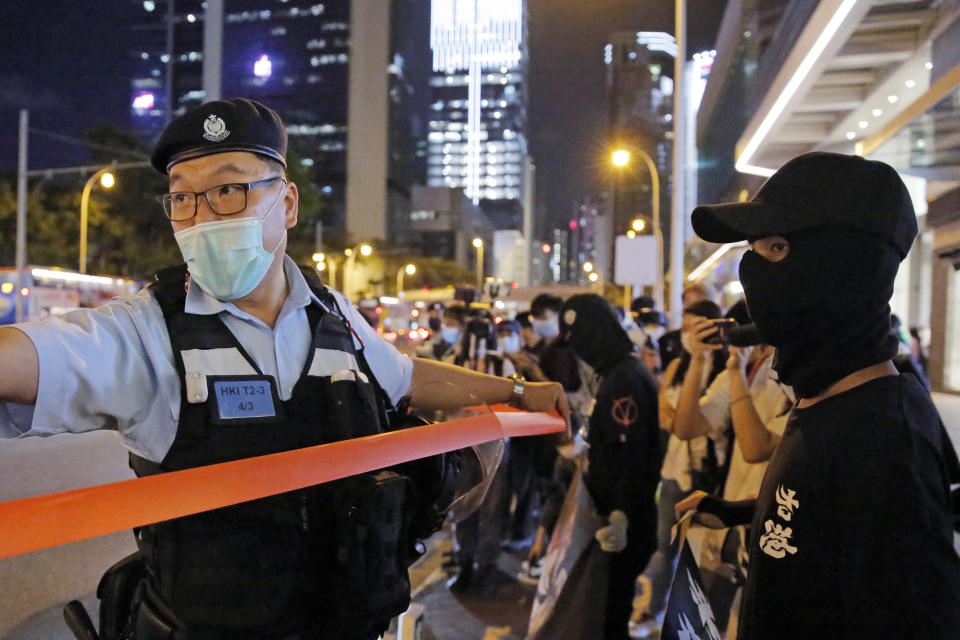China's drastic move could be 'the end of Hong Kong'
Hong Kong activists called for a protest march on Friday against Beijing's plans to impose national security legislation in the city, prompting alarm that the new laws could erode its freedoms through "force and fear".
Local pro-democracy lawmakers denounced the plans on Thursday night as "the end of Hong Kong".
Civl Party lawmaker Dennis Kwok told reporters "if this move takes place, 'one country, two systems' will be officially erased”.
“Beijing, the people's government, has completely breached its promise to the Hong Kong people.
“Make no mistake about it. I foresee that the international status of Hong Kong as a city, international city, will be gone very soon.”

China's proposed new legislation for Hong Kong requires the territory to quickly finish enacting national security regulations under its mini-constitution, the Basic law, according to a draft of the legislation seen by Reuters.
The document said the law will tackle secession, subversion and terrorism activities, as well as foreign interference.
It says it will safeguard the central government's "overall jurisdiction" as well as Hong Kong's "high autonomy".
Previous protests triggered China’s move
Insiders say the protests in 2019 were the last straw for the Communist Party of China after they perceived the purpose of rallies shifting to an anti-government movement, The South China Morning Post reported.
Violent clashes, attacking facilities and government buildings, and burning and stamping on the national flag are believed to have in some part triggered the move.
It is feared similar protests to the ones in response to China’s controversial and now-withdrawn extradition bill will return to the streets of Hong Kong.
Hundreds of thousands of people lined the streets daily, while a minority clashed with authorities, with conflict often turning violent.
"We kind of expected China to do something to suppress us. This step is too much," said Leung, 21, a criminology student in Hong Kong.

The move hit financial markets, due to concerns the semi-autonomous city's status as a global financial hub was at risk, with Hong Kong stocks selling off as China's parliament sat on Friday to discuss the new law.
While it was unclear whether an unauthorised march, proposed to start about midday (local time) near the central financial district and end at China's Liaison Office, will materialise, it was a sign that Hong Kong could soon plunge into renewed unrest.
Move likely to fuel US-China feud
The legislation could be a historical turning point for Hong Kong and heighten geopolitical tensions between Beijing and Washington, whose relationship is already weakened by trade disputes and reciprocal accusations over the coronavirus pandemic.
"It is starting to look like a US-China summer of discontent in the making," said Stephen Innes, chief global market strategist at AxiCorp.
Innes said the new law could potentially reignite the pro-democracy demonstrations of 2019, the biggest crisis the former British colony has faced since it returned to Chinese rule in 1997.
The last British governor of Hong Kong, Chris Patten, called the move a "comprehensive assault on the city's autonomy" and called for the UK to “tell China this is outrageous”.
Hong Kong stocks fell 3.2 per cent, leading falls in Asia and the Hong Kong dollar dropped slightly against the US greenback.
Speaking on Friday in his annual report to the Chinese parliament, Premier Li Keqiang said China will establish a "sound" legal system and enforcement mechanisms to ensure national security in Hong Kong and Macau, its other semi-autonomous city.
A previous attempt to adopt similar legislation in 2003 was met with a protest that drew around half a million people onto the streets and was eventually shelved.

Pro-democracy activists and politicians have for years opposed the idea of national security laws, arguing they could erode the city's high degree of autonomy, guaranteed under the "one country, two systems" handover agreement, which China says is undermined by protesters.
"It is essentially declaring directly that 'one country two systems' is null and a failure," said Eric Cheung, principal lecturer at Hong Kong University's department of law.
Hong Kongers silenced ‘with force and fear’
Local pro-democracy lawmakers were vocal following the news, fearing Hong Kong would lose its remaining independence from the mainland.
"Beijing is attempting to silence Hong Kongers’ critical voices with force and fear," pro-democracy activist Joshua Wong tweeted. "Deep down protesters know, we insist not because we are strong, but because we have no other choice."
The introduction of Hong Kong security laws on the agenda of the Chinese parliament, which begins its annual session on Friday after a months-long delay due to the coronavirus, drew a warning from US President Donald Trump that Washington would react "very strongly".
The US State Department also warned China, saying a high-degree of autonomy and respect for human rights were key to preserving the territory's special status in US law, which has helped it maintain its position as a world financial centre.
Taiwan's Mainland Affairs Council urged Beijing on Friday not to lead Hong Kong into "bigger turmoil" due to wrong policy decisions.
An editorial in the state-backed China Daily newspaper late on Thursday said the proposed legislation will "better safeguard Hong Kong's development".
"The overreaction of those rioters and their foreign backers, who see such legislation as a thorn in their side, only testifies to the pertinence of the decision and the urgent need for such legislation," it said.
with Reuters
Do you have a story tip? Email: newsroomau@yahoonews.com.
You can also follow us on Facebook, Instagram and Twitter and download the Yahoo News app from the App Store or Google Play.



